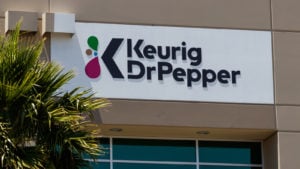Investors have also watched the markets try to make sense of valuations for leading equities, especially the Magnificent Seven, and how to pivot. Those factors and more suggest now is an excellent time to lean defensive for investors.
Should the economy and stock market worsen, a stronger defensive position will provide income dividends to buffer against greater losses. And should the economy and stock market improve most defensive stocks are still reasonable investments overall as they tend to be fundamentally sound.
Investors should not let fear overwhelm them and instead follow the time-tested wisdom of the markets.
Wendy’s (WEN)

Wendy’s (NASDAQ:WEN) is a stock worth considering right now for a number of reasons. Let’s jump into those reasons straight away without an explanation of its business, as the company is a household name.
Firstly, let’s consider competition and why Wendy’s could garner more attention soon. As you may have guessed, I’m referring to McDonald’s (NYSE:MCD) and its troubles. Inflation has resulted in McDonald’s facing real issues at the moment. Worldwide sales recently fell for the first time in four years. McDonald’s is making serious efforts, but it opens a door for Wendy’s and its stock.
Wendy’s gave strong sales guidance for the upcoming quarter despite a revenue miss in Q2. That could be enough to drive investors toward the burger chain and its shares.
Rate cuts are coming, and they should help the company, which has dealt with rising interest payments over the few past years.
Finally, and perhaps most importantly, Wendy’s stock includes a dividend yielding 5.84%. The company has grown that dividend by nearly 20% over the past five years, so management is focused on rewarding shareholders.
Keurig Dr Pepper (KDP)

Keurig Dr Pepper (NASDAQ:KDP) stock may just be the new Coca-Cola (NYSE:KO).
Investors almost instinctively flock to Coca-Cola as a well-known defensive juggernaut when market troubles arise. The company long ago became an earnings machine. It has remained so and continues to reward shareholders through thick and thin.
Whenever I write about Coca-Cola, I refer to its excellent gross margins as proof that the company enjoys a strong economic mode through pricing premiums. Keurig Dr Pepper is not far behind Coca-Cola in that regard. Its gross margins are nearly as high, suggesting similar durable competitive advantages.
KDP shares are priced correctly at the moment. That should reassure investors who have balked at frothy valuations led by the share price growth in leading tech firms.
Keurig Dr Pepper doesn’t have the same track record as Coca-Cola when it comes to dividends. However, what KDP shares lack there, they make up for in growth potential. The dividend itself adds a 2.5% buffer against current market volatility.
Invitation Homes (INVH)

Invitation Homes (NYSE:INVH) is a single-family residential REIT with a stock worth considering for investors.
It’s a safe haven stock for several reasons. It provides a dividend yielding 3.14%. Again, that’s a strong buffer against current turmoil that has seen the markets lose several percentage points on multiple days.
That’s far from the only reason to consider INVH shares. Revenues have grown steadily in the 8% to 10% range over the past few years. Net income growth, too, has been strong over that time frame.
However, I’d point potential investors to the effects of upcoming rate cuts as a major factor for potential investors. The company’s interest expenses have been rising steadily and should fall as rate cuts are implemented. That isn’t to say INVH is in any trouble currently. Its dividend looks quite safe based on FFO payout ratios below 70%.
The firm’s fundamentals — already sound — should continue to improve as the positive effects of rate cuts hit.
Rexford Industrial Realty (REXR)

Let’s look at another REIT stock in a different sector, Rexford Industrial Realty (NYSE:REXR). This company develops infill industrial properties in Southern California.
The term infill industrial properties refers to demolishing older industrial properties and replacing them with new facilities. The company believes it has cornered the world’s fourth-largest industrial market, which it qualifies as having the highest demand with the lowest supply nationwide.
The company’s portfolio spans 371 properties, covering approximately 45 million square feet of rentable space.
With any sort of REIT investment, investors should immediately look at the dividend and its suitability. Yield and risk are primary factors any investor must consider. Rexford Industrial Realty’s dividend yields 3.4%. As a REIT, investors have to look at FFO payout ratios to determine whether to expect continuous payments. Rexford Industrial Realty boasts an FFO payout ratio In the 55% to 70% range, which is considered healthy.
The company is undoubtedly booming from a top and bottom-line perspective and deserves investor attention, especially in these volatile times.
Coca-Cola FEMSA (KOF)

Coca-Cola FEMSA (NYSE:KOF) is the franchise bottler for Coca-Cola serving Mexico, Nicaragua, Guatemala, Costa Rica, Panama, Colombia, Brazil, Argentina and Uruguay. The stock offers a few advantages over its parent, including a dividend yielding 3.81% currently. That’s a full 1% higher than the dividend available through KO shares.
Coca-Cola FEMSA last reduced its dividend in 2018. Coca-Cola hasn’t reduced its dividend since 1963. KO is clearly less risky, but for that relative safety, investors give up 1% in returns. It’s something to think about.
Regardless, Coca-Cola FEMSA is growing healthily. Revenues grew by 12.7% during the first 6 months of 2024. Meanwhile, net income increased by nearly 20% over the same time frame.
To be honest, both Coca-Cola and Coca-Cola FEMSA make strong investments as recession fears grip Wall Street. One key differentiating factor, dividend yield aside, is that Coca-Cola FEMSA has much more upside potential at the moment.
Unum Group (UNM)

Unum Group (NYSE:UNM) is a large insurance firm currently trading near target price lows. Let’s start with some quick arithmetic that suggests it’s a good investment.
Unum Group’s consensus target price is $61.50 and trades for $52.80 as I write this. The dividend pays $1.68 annually. That equates to more than a 19% upside in the base case scenario. Remember, UNM shares are steady overall and have continued to grow consistently following the initial onset of the pandemic.
Although Unum Group’s earnings have shrunk over the past 12 months, the stock’s P/E ratio is still attractive. The company has undertaken a large share buyback program and is distributing earnings to shareholders.
Generally speaking, Insurance firms are safe haven stocks in times of market volatility. They tend to not move as violently as other stocks and have lower betas. They usually preserve capital better for that reason. Additionally, Unum and others like it provide dividend income, in its case 3.13%, further buffering against potential downturns.
Richmond Mutual Bancorporation (RMBI)

Richmond Mutual Bancorporation (NASDAQ:RMBI) is a regional bank with a stock income investors will like.
That stock includes a dividend yielding 4.57% presently. The dividend has a healthy payout ratio below 0.7 and was last reduced in 2020. It appears safe overall.
Richmond Mutual Bancorporation is similar to most banks in terms of leverage. The company holds roughly $10 of liabilities for every $1 of shareholder equity. Banks tend to be highly leveraged and borrow tremendous amounts of money, which is then loaned back out. Banks make money on the spread between the borrowing rate and lending rate. Anyway, Richmond Mutual Bancorporation is relatively average in that regard. It isn’t over-leveraged.
Like all other banks, RMBI should do well soon due to expected rate cuts. Those cuts should allow the company to improve its spread while lowering borrowing costs and overall risk. All of those factors together make RMBI shares ones to consider.
On the date of publication, Alex Sirois did not have (either directly or indirectly) any positions in the securities mentioned in this article. The opinions expressed in this article are those of the writer, subject to the InvestorPlace.com Publishing Guidelines.
On the date of publication, the responsible editor did not have (either directly or indirectly) any positions in the securities mentioned in this article.
Alex Sirois is a freelance contributor to InvestorPlace whose personal stock investing style is focused on long-term, buy-and-hold, wealth-building stock picks. Having worked in several industries from e-commerce to translation to education and utilizing his MBA from George Washington University, he brings a diverse set of skills through which he filters his writing.
